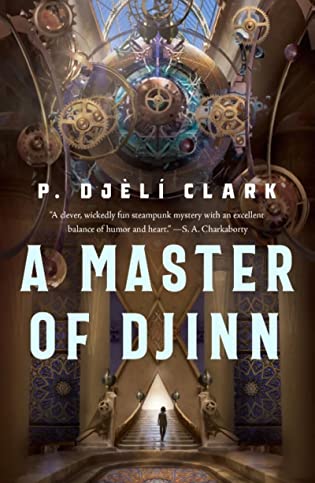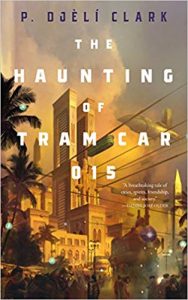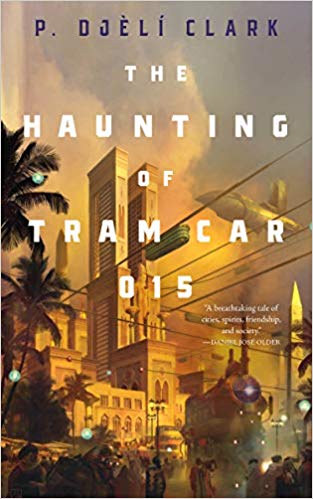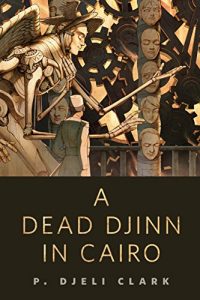 A Master of Djinn by P. Djèlí Clark
A Master of Djinn by P. Djèlí Clark Format: eARC
Source: supplied by publisher via Edelweiss
Formats available: hardcover, ebook, audiobook
Genres: epic fantasy, fantasy, steampunk, urban fantasy
Series: Dead Djinn Universe #1
Pages: 400
Published by Tordotcom on May 11, 2021
Purchasing Info: Author's Website, Publisher's Website, Amazon, Barnes & Noble, Kobo, Bookshop.org
Goodreads
Nebula, Locus, and Alex Award-winner P. Djèlí Clark returns to his popular alternate Cairo universe for his fantasy novel debut, A Master of Djinn
Cairo, 1912: Though Fatma el-Sha’arawi is the youngest woman working for the Ministry of Alchemy, Enchantments and Supernatural Entities, she’s certainly not a rookie, especially after preventing the destruction of the universe last summer.
So when someone murders a secret brotherhood dedicated to one of the most famous men in history, al-Jahiz, Agent Fatma is called onto the case. Al-Jahiz transformed the world 50 years ago when he opened up the veil between the magical and mundane realms, before vanishing into the unknown. This murderer claims to be al-Jahiz, returned to condemn the modern age for its social oppressions. His dangerous magical abilities instigate unrest in the streets of Cairo that threaten to spill over onto the global stage.
Alongside her Ministry colleagues and her clever girlfriend Siti, Agent Fatma must unravel the mystery behind this imposter to restore peace to the city - or face the possibility he could be exactly who he seems....
My Review:
From a certain perspective, A Master of Djinn is urban fantasy of the old alternate history school of urban fantasy. Urban fantasy so often revolves around one of two premises, either that magic has always been here, and most of us just haven’t noticed – or the other side of that coin, that once upon a time there was magic that either slowly or quickly left, but that something or someone has made the magic return. Usually with world shaking or world shattering results.
A Master of Djinn is definitely one of those stories where the magic has returned. But it isn’t a story about what happens when that magic returned. Instead, and more interestingly, this is a story that takes place about 50 years later, when the magic has more or less become part of the new fabric of the world and history has adapted around it – whether people have or not.
This story takes place in Cairo – Egypt and definitely not Illinois (a tip of the hat to American Gods which is surprisingly apropos in the end) – in an alternate 1912. The re-introduction of magic has changed the world in a whole lot of ways while at the same time the great forces of history that brought about World War I in our history are still very much in train. A train that might still be forced off the metaphorical rails – but might not. And will certainly cause worldwide destruction either way.
At the same time, also very much a part of urban fantasy, there’s a mystery to solve. And someone to solve it, in this case Agent Fatma el-Sha’arawi of the Ministry of Alchemy, Enchantments and Supernatural Entities. Fatma is one of the few women in an agency that is still mostly male dominated, and a native Egyptian in a world where Egypt has thrown off the yoke of British colonial power – no matter how reluctant the British are to accept that the Raj is dying and that the new world order looks like it will push the countries with old magic – the countries they once colonized – into the forefront.
The case that Fatma has to solve very much intertwines the new world and the old. From the very outset, it seems like it’s a crime of magic. And so it is. But like all the best of urban fantasy, which A Master of Djinn very much is, magic may be the modus operandi but it is not the reason behind any or all of the crimes involved.
Someone in Cairo wants to become the master of all the djinn that have become part of the city’s rise to power, and part of the brave new world that they brought with them. And they don’t care how much of the city – or the world – they have to destroy in order to get their way.
After all, the aphorism about power corrupting, and absolute power corrupting absolutely, is entirely, completely and utterly about humans. Especially the human at the heart of this case.
 Escape Rating A++: Honestly, I want to just sit here and squee. A lot. This was amazingly awesome from beginning to end and I don’t say that lightly. This is one of those stories that made me think pretty much all the thoughts and I’m still reeling a bit from the absolutely epic book hangover.
Escape Rating A++: Honestly, I want to just sit here and squee. A lot. This was amazingly awesome from beginning to end and I don’t say that lightly. This is one of those stories that made me think pretty much all the thoughts and I’m still reeling a bit from the absolutely epic book hangover.
I also think the 400 page count is a bit of an underestimate. This is a lot of book, in scope, in depth and in size. If It sounds interesting but you’re wondering whether you will like it or not, there are three very short reads set in the same universe but not direct prequels to this story. So if this universe sounds like fun, The Angel of Khan el-Khalili is only 32 pages and is available free at Tor.com, A Dead Djinn in Cairo is only 45 pages and The Haunting of Tram Car 015 is 116 pages. Long enough to give you a taste without devoting the weekend that A Master of Djinn really, really consumes.
And I’m telling you that because I loved this book and just want to shove it at people to read. I’m not above using ANY of the short works in this universe as a gateway drug in order to accomplish that.
Speaking of gateway drugs, two books that A Master of Djinn reminded me of A LOT are Three Parts Dead by Max Gladstone and Snake Agent by Liz Williams. In combination, they represent two of the elements of the Dead Djinn Universe, that mix of the cities powered by magic and worlds where the divine and the supernatural walk among humans as ordinary citizens. Three Parts Dead has a similar steampunk “feel” as A Master of Djinn while Snake Agent is also urban fantasy in that the continuing character is a government agent who solves crimes involving the supernatural and the other-than or more-than human.
One more digression, probably not the last. The way that the world has been pushed onto a new axis has endless possibilities and not just in Agent Fatma’s Cairo. This is a world where the colonizers have all been pushed hard off their thrones and dominions because they either don’t have old magic in their history and/or have deliberately pushed aside and suppressed old magic in the places they thought they “conquered”. It’s not all djinn. We already know it’s not djinn in Germany because we meet Kaiser Wilhelm and his goblin advisor. It’s not going to be djinn in the Americas, either. But whoever and whatever comes back wherever, the colonizers are already the ones finding themselves ground under someone else’s bootheel – and they don’t like it and are going to fight back. All of which has the potential to be totally epic.
But those are stories for another day. Today we have Agent Fatma, her Cairo, and the would-be master of the djinn. Who don’t want a master at all – thankyouverymuch.
The story is mostly told from Fatma’s perspective, although not in the first-person. It’s more that she’s the character we follow rather than seeing the story from inside her head. Still, I think the reader needs to like her and feel for her as she does her best to work the case that has the powers-that-be so upset. As I most definitely did.
She’s caught between frustrations and multiple nexus (nexi?) of power. She’s a woman in what is still a man’s world, constantly needing to prove herself by being better than the best. At which she mostly succeeds.
At the same time, she’s part of a world that is, in its entirety, in the midst of change. Not just the change that women are slowly but steadily invading what were formerly all-male preserves, but also a world where the political status quo has turned upside down. While the political and economic power in Egypt and elsewhere around the world has been taken out of the hands of the British and other colonizers and returned to the citizens and residents – and their own elected or hereditary leadership – who are part of the once-colonies – there is still plenty of residual feeling, both reverence and resentment – for individuals who used to be part of the colonial power structure.
And money always talks. The rich are still different from you and me, as that saying goes. The wealthy, in any time and place and of any origin, are able to buy their own version of justice.
We follow Fatma as she navigates those waters, balancing her need to investigate the case, her necessity of not pissing off her bosses and getting herself demoted or fired, her desire to protect her city and those she loves, and the absolute necessity of exposing a criminal who is trying not just to reach the sky and touch the sun, but to bring it down to earth and make it work at her command.
Fatma will need all of her wits and all of her friends in both high and low places in order to bring justice and save not just her city but her world from utter destruction. As we follow her on her quest, we learn exactly why she’s the right woman – and the right agent – for the job.
I sincerely hope we get to read more of her adventures, because she’s awesome and so is her story.

 The Haunting of Tram Car 015 by
The Haunting of Tram Car 015 by  We only get hints of what the djinn are capable of in this story (I hope there’s more in the author’s previous work,
We only get hints of what the djinn are capable of in this story (I hope there’s more in the author’s previous work,